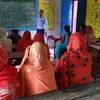This hyperlocal platform helps you donate in kind to NGOs in need
HappieeSouls, based in Bengaluru, helps you connect with verified NGOs to donate unused and unwanted goods, ensuring sustainability.
With all the advancement in technology and data, Sonika Gahlot Nayak reached a roadblock in 2017 while looking for an online list of charity organisations where she could volunteer over weekends and donate clothes and books. She was surprised there weren’t many platforms that listed verified and geo-tagged charities across India.
To bridge this gap, and in an effort to connect NGOs from across the country, Sonika launched , a platform that connects individuals, corporates and NGOs. Based in Bengaluru, HappieeSouls lists orphanages, old age homes, animal shelter homes and schools for the underprivileged.
When she first began, Sonika personally visited each of the NGOs across Bangalore to collect insights on how the industry functions. She also identified various pain points and challenges faced by some of the smaller organisations.
“Some of the organisations were unable to raise funds for their daily expenses and maintenance, so they preferred to accept donations in kind. Most larger NGOs only accepted cash donations,” Sonika says.
The HappieeSouls website was launched to enlist transparent, proven, geo-tagged NGOs with images and verified legal documents. It does not charge the NGOs to create their profiles on the platform, which works for most NGOs as a mini-website with details about their operations, focus areas and target audience.
In Oct 2020, amidst the COVID-19 pandemic, HappieeSouls launched its doorstep pick up services to enable people to send supplies from their house directly to the NGO they choose to associate with.

Sonika Gahlot Nayak
Connecting NGOs
“HappieeSouls also aims to create a sustainable lifestyle as a culture across India. With the rise of online shopping, our houses today are cluttered with unwanted goods - be it clothes, toys, furniture, books or utensils,” says Sonika.
She adds that the platform picks up unused or unwanted goods and delivers it directly to the customers’ chosen NGO. The customers also get real time updates and confirmation of their delivery, along with details on how they have made a difference to the ecosystem,” she adds.
What further helps is that HappieeSouls provides its customers with a list of NGOs that have pre-listed their monthly/yearly requirements. This ensures the charities are not treated as dump yards for unwanted goods.

During one of the NGO activities
HappieeSoul’s model is a simple two-step process – the customer first goes through the wanted items list posted by an NGO, they then add the quantity of goods they want to donate and have them ready in bags or cartons for a socially distanced pick up.
A convenience fee of Rs 200 to Rs 5000 is charged for delivery, depending on how many goods are being sent and the mode of delivery - two-wheeler, three-wheeler or a mini truck (for furniture and larger appliances).
Sonika says her primary focus is to bring more structure to this unorganised market, and eliminate the need for segregation that NGOs have to undertake after receiving multiple cartons of random goods. This process saves resources and also helps to bridge the gap between surplus and shortage of goods across India.
The impact
HappieeSouls now has over 300 NGOs from Delhi, Mumbai, Bengaluru, Hyderabad and Chennai on its database, and over 500 registered customers. The listing varies depending on the city and area. More than 10,000 goods including clothing, utensils, toys, and furniture have been donated in-kind and over 3000 disadvantaged NGO residents in need of goods have been aided.
“We work directly with grassroots level NGOs, orphanages, old age homes and shelter homes. To name a few, we work with Aarohan, Rainbow Homes, Pragathi Trust, Mythri Orphan Home, Open Door, Shraddha Orphanage and Aasra Trust,” says Sonika.

Sonika at of the NGO activities conducted by HappieeSouls
People who are relocating within India or going abroad prefer to donate their goods, but struggle to find the right platforms to enable efficient delivery and management of the goods. HappieeSouls eliminates this pain point by connecting to NGOs that are really in need and can benefit from donations.
“Recently, we were able to provide 50,000 ration kits for underprivileged families within a two-day timeframe. In the past, we have also raised in-kind donations within a four-day period that included stationery, books and toys for a summer camp organised by an NGO for children,” Sonika shares.
The organisation is currently bootstrapped by Sonika. The company is, however, looking to raise a seed fund round in the next quarter to enable scaling up its services and launching in more cities in the country.
Detailing some of the challenges that she has faced, Sonika says, “As a solo woman entrepreneur, I faced some logistical challenges initially. Now, we are facing a monetary challenge as we need partners and funds to be able to scale our operations across more cities in the country, hire more people to join our team, and make a difference to more NGOs in need.”
The way forward
“We operate in a circular economy, and want to enable a higher awareness of sustainable lifestyle in India. We are in the process of partnering with new-age companies and social impact businesses who enable recycling and upcycling of second-hand goods,” says Sonika.
The company also plans to fully adopt and encourage the three Rs of ‘Reuse-Recycle-Reduce’ by providing NGOs with the right supplies and encouraging more large scale companies to move towards sustainable business models.
“The power of “giving” has a huge impact on our society. As a country of over 1.4 billion citizens, we can move towards a more sustainable future, where we recycle, reuse and help each other live a more holistic and fulfilling life,” concludes Sonika.
Edited by Anju Narayanan








